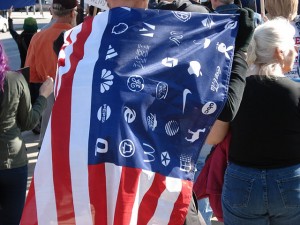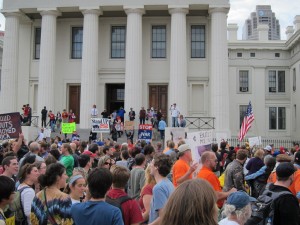Two years ago, I was excited to see Barack Obama elected President because I had listened closely to his campaign speeches and I assumed that I would now have a meaningful voice in how my government was being run. I assumed that we would see an immediate decrease to America’s warmongering, domestic spying and fossil-fuel dependence, for example. Since that election, though, I’ve witnessed Mr. Obama cave-in to right wing demands on numerous major issues. I’ve seen Wall Street “reform” that allows bigger “banks” than ever. I’ve seen health care “reform” that shoved single payer under the table and consisted of a sell-out to for-profit monopolistic insurers, without any meaningful price controls. Government spying and secrecy are more prevalent than ever. I’ve seen big business spend more money more flagrantly than ever to purchase politicians, including Barack Obama.
As all of this has transpired, I keep being reminded of George Carlin’s words, (at the two-minute mark) that there is a “big club . . . and ain’t in it. . . . You and I are not in the big club.”
To top off this perversion of democracy, most of the mass media has been acting like nothing terrible is going on. Instead of giving us nightly headlines that our democracy has been stolen by businesses that don’t care about the well-being of ordinary Americans, most television and newspapers have been distracting us with horserace politics, trite conflict, ignoramuses posing as experts and celebrity news. I now look back to Obama’s inauguration and I regret how naïve I was to think that I had voted for meaningful change. Since that day I’ve been feeling increasingly disenfranchised. I’ve been feeling l’ve been living in a country that is not mine. I’ve been feeling ostracized.

It seems to me that the word “ostracism” completely captures the situation where ordinary citizens like me are being excluded from the American political process. Yes, these ostracized citizens have been allowed to vote in national elections, but these elections are mostly meaningless, in that national politicians of both major parties have consistently furthered a pro-corporate pro-warmongering pro-fossil-fuel and social-safety-net-cutting agenda that runs diametrically against the will of America’s super majority of citizens. Further, the concerns of most people of the United States, far and wide, are not reflected in the mainstream media. Instead, we are fed shows that feature political hacks, celebrities, sports, hyped-up conflict, divisiveness, bigotry and constant homage paid to those who have large piles of money and therefore access to the federal government. In short, for at least the last few of decades, 99% of Americans have been thoroughly and unabashedly ostracized. Thus my question: what can science tell us about the effects of this ostracization?
In the January/February 2011 edition of Scientific American Mind, Kipling D Williams describes the science of ostracism. What is it to be “ostracized”?
Typically the term–defined simply as being ignored and excluded–implies a situation in which a group is shunning an individual, but it could also describe “the silent treatment, in which one individual ignores another, or a group excludes another group or even an individual rejects a group.”

It almost goes without saying that the human animals have deep desires to belong to groups. Williams explains: “People obey, conform, cooperate, engage in group think and may even become reluctant to help others–all to remain part of the gang.” What happens when people are excluded from a larger group? It causes sadness, anger, lowered self-esteem and lessened feelings of belonging. “Studies reveal that even subtle, artificial or ostensibly unimportant exclusion can lead to strong emotional reactions.” These strong feelings are warning signs that are social and psychological well-being are being threatened. How fundamental are these needs to belong? Some researchers have argued “[t]hat belonging, self-esteem, a sense of control over your life, and a belief that existence is meaningful constitute four fundamental psychological needs that we must meet to function as social individuals.”
Williams, who has done laboratory work on ostracization, concludes that total exclusion from groups severs social bonds, but it does even deeper damage.
Social rejection also deals a uniquely harsh blow to self-esteem, because it implies wrongdoing. Worse, the imposed silence forces us to ruminate, generating self-deprecating thoughts in our search for an explanation. The forced isolation also makes us feel helpless. You can fight back, but no one will respond. Finally, ostracism makes our very existence feel less meaningful because this type of rejection makes us feel invisible and unimportant . . . [S]ocial exclusion interferes not only with reproductive success but also with survival. People who do not belong are not included in collaborations necessary to obtain and share food and also lack protection against enemies.
Just listen to our caretakers scold those of use who merely ask for the representative democracy granted to all of us by the U.S. Constitution. In the press, they condemn us as dirty, immoral traitors and scofflaws. They are trying to hit us at our Achilles heels. They know that many people sitting at home know that the Occupy Protesters are correct, but those people at home are afraid to get out there to stand and march with the protesters because the police might scowl at them and “their” politicians will condemn them. They will be especially barked at by conservatives who are hypocritically urging their own followers to take to the streets because it’s a “patriotic” thing to do.
Based on a 2003 study, Williams determined that the emotional damage done by social isolation is registered as physical pain in the brain, so much so that this sort of social pain is relieved by physical pain killers such as acetaminophen. He is found that this physical pain affects people of all personality types, “no matter how tough they seem to be.” This pain is so intense that it often “transcends circumstance and reason.”
Again, this explains the tactic of many who oppose the Occupy Movement; having confiscated most of the news media long ago, they use it as a bullhorn to condemn the protesters instead of listening to them. They work hard to inflict pain on the protestors by ridiculing them.
How do people respond to ostracism? Williams explains that we do this in various ways. Some of us become obeisant–we fall in line and we learn to behave better, in order to be accepted. “We do this by agreeing with, mimicking, obeying or cooperating with others.” Other people respond by “slinking away or escaping from the oppressive clique.
Williams points to another laboratory experiment that points out yet another approach; in the experiment, subjects preparing food for others, who were given an opportunity to secretly douse the food with excessive doses of hot sauce did so. Therefore, many of us who are ostracized lash out at those who exclude us. Those who are ostracized often react with “hostility because they feel a need to regain a sense of control or, in cases of overt aggression, because they want to be noticed after being made to feel invisible… In extreme cases, ostracized humans may resort to aggressive or violent acts when they have lost hope of being included in any socially acceptable group.”
If it can be accurately suggested that the American political process has essentially ostracized most of its citizens, it would seem that there is a legitimate risk that the Occupy protests could turn aggressive or violent if not carefully orchestrated by the protesters. How can those feeling the pain of ostracization avoid such violence? Williams, who did not apply his findings to current protests (his article was published months before the OWS protests) suggests that those who have been excluded could try to escape the scene of the ostracizing in order to avoid becoming belligerent, and or distract themselves with other activities. Fair enough, but that would not serve the social movement currently being brought by the 99%.
Williams’ other suggested remedy would actually serve the needs of the 99% protesters: “Although being accepted into the group that ostracized us is often difficult, other groups will embrace you if you are especially cooperative, hard-working and agreeable.”
Again, in his article, Williams did not apply his findings to the current protests. Nonetheless, his observation seems intuitively correct that finding membership in a new group will greatly lessen the pain of being rejected by an earlier group. And what better group to have you as a member than a group consisting of people who have all been rejected by the same group. It would seem, then, that joining together with other Occupy groups (the 99% folks) is an ideal way to assert political power effectively and to lessen the pain of decades of political ostracism.
To the extent that the Occupy Wall Street protests continue to grow, this would offer both a revolution and a chance to heal. The fact that these protesters have found each other in hundreds of cities is the first thing I’ve ever seen to disprove George Carlin’s then-correct observation (the above video at the 2:20 mark): “Nobody seems to notice; nobody seems to care.”
The Occupy movement has the power to make up for so many years during which those who own our politicians have been ignoring the needs (and in many cases, the existence) of ordinary American citizens. Again, the Occupy movement offers meaningful and productive revolution as well as therapy for the millions of us who have been brutally ostracized for years. It offers the 99% a chance to feel ownership in their own country and to feel democratically interconnected with each other.

